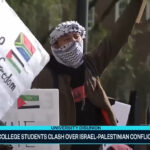Moral Dementia at Stanford and Berkeley
In a display of moral narcissism that British columnist Melanie Phillips has characterized as a “dialogue of the demented,”Stanford students staged a public protest on October 19th to once again denounce Israel and, presumably, to honor the slain homicidal Palestinians who have so far claimed the lives of 11 Israelis in a recent spate of violence in Jerusalem and parts of Judea and Samaria.
The protest, organized by the vitriolic Students for Justice in Palestine (SJP), followed in style and substance an equally debased display of moral self-righteousness at Berkeley, where a similar gathering on October 13th saw protesters enthusiastically chanting “long live the intifada” and “we support the intifada,” in other words, extolling the current homicidal rampage in Israel in which youthful terrorists have used knives, guns, stones, and vehicles to randomly murder Jewish civilians. In fact, the use of that word “intifada” is a grotesque and murderous reference to the Second Intifada that began in 2000, during which Arab terrorists murdered some 1000 Israelis and wounded more than 14,000 others.
Students for Justice in Palestine was founded by Berkeley professor Hatem Bazian, who in 2004 called for an intifada in the United States, and has become a disruptive, corrosive presence on many campuses with its disruptive, mendacious anti-Israel activism. The Stanford chapter, like others, has as its stated mission to work “toward justice and the recognition of universal rights for all current and displaced residents of historic Palestine,” meaning only the Palestinians at the expense of, and to the detriment of, Israelis. This notion of “justice” has only one beneficiary in a zero sum game where justice is achieved, not by having two states living side by side in peace, but through the creation of a new Palestinian state in the place of Israel.
“We stand in solidarity with the Palestinian people’s struggle for self-determination, justice, and equality,” the mission statement continues, intentionally ignoring the current existence of a sovereign Jewish state and allowing that self-determination is only acceptable for Palestinian Arabs and not, it seems, for Jews.
In reality, the pro-Palestinian SJP seem to care very little about the actual self-determination and state building of the hapless Palestinians. As is frequently the case when speaking about the Israeli/Arab conflict, the discussion often glosses over the real problems of Palestinian culture, politics, and society (including its cult of death and martyrdom), and targets all criticism on the perceived defects of Israel, Zionism, and Jewish power. All of the blame for the conflict is placed on the so-called occupation, the “apartheid wall,” the oppression and militarism of the Zionist regime, and the brutal humiliation and collective punishment Israel is said to mete out on a daily basis upon the wholly innocent Palestinians.
The chronic truculence of the Palestinians in having rejected opportunities for statehood on multiple occasions, of course, is never mentioned, and other causes that have led to Palestinian suffering are pointed to. One of the placards at the Stanford rally, for instance, read “Settler colonialism has killed 7 Israelis and 32 Palestinians this month,” naively assigning blame for the recent carnage, not where it belongs—with the homicidal young teenagers and others who barbarically murdered or tried to murder Jewish parents in front of their children, or riding at buses, or standing on street corners—but with the disingenuous and factually defective charge of “settler colonialism.”
That pro-Palestinian student activists, those who purport to be motivated by a desire to bring “justice” to the Middle East and who, presumably, care about all human lives, could publicly call for the renewed slaughter of Jews in the name of Palestinian self-determination demonstrates quite clearly how ideologically debased the human rights movement has become. Activists on the Stanford and Berkeley campuses, who never have to face a physical threat more serious than getting jostled while waiting in line for a latte at Starbucks, are quick to denounce Israel’s very real existential threats and the necessity of the Jewish state to take counter measures to thwart terrorism against its civilian population. And quick to label the killing of terrorists by the IDF as “extra-judicial” killings, these well-meaning but morally-blind individuals see no contradiction in their calls for the renewed murder of Jews for their own sanctimonious cause.
At Berkeley, protestors were shouting out the oft-heard slogan, “From the river to the sea, Palestine will be free.” That phrase suggests the same situation that a rekindled Intifada would help bring about, namely, that if the fictive nation of “Palestine” is “liberated,” is free, there will be, of course, no Israel between the Jordan River and Mediterranean—and no Jews.
Those students who lend their moral support to terrorism, and who continually see the existence of “grievance-based violence” as a justifiable tool of the oppressed, have helped introduce a sick moral relativism into discussions about radical Islam and Palestinianism, not to mention Israel’s right to protect its citizens from being slaughtered.
That those students purporting to care about attaining social justice for the downtrodden are willing to let another group of people be murdered as part of that well-meaning campaign demonstrates quite clearly that a moral dementia has enveloped the anti-Israel crowd in a way that is both frightening and tragic, and we should see it for what it really is.
Richard L. Cravatts, president of Scholars for Peace in the Middle East, is the author of Genocidal Liberalism: The University’s Jihad Against Israel & Jews.





